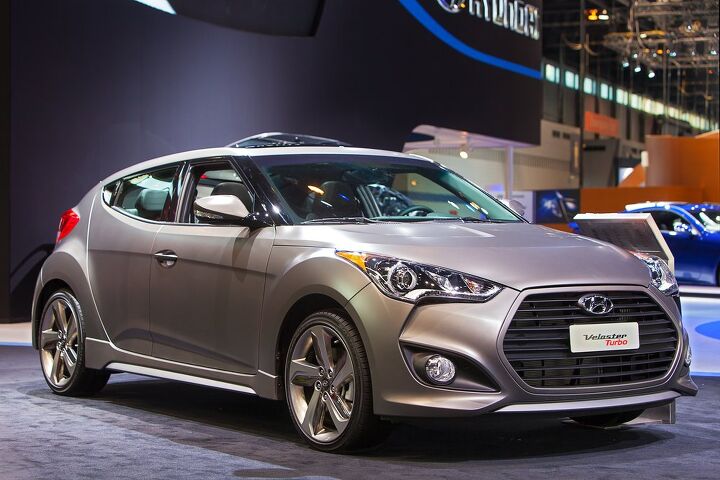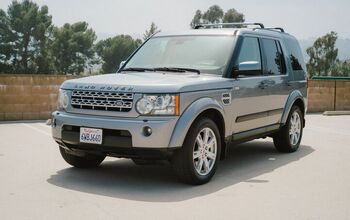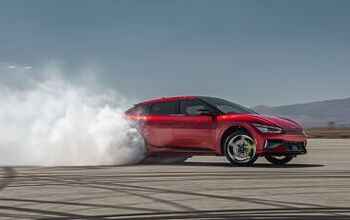Hyundai Veloster Recalled Over Odd Parking Sensor Defect

Hyundai is recalling 26,169 decade-old Velosters over parking sensors that could short circuit and pose a fire risk. Insufficient sealing of the printer circuit board for the Reverse Park Aid Sensor (RPAS) could allow water to infiltrate the unit, according to the relevant documentation from the National Highway Traffic Safety Administration (NHTSA). In certain instances, this could cause an electrical short that may throw off sparks.
The recall, launched at the very end of February, isn’t new. However, the limited nature of the problem on an older model meant it hasn’t gotten much attention. Consumer Reports covered the matter shortly after the paperwork was filed with the NHTSA. But it only recently started getting broader attention after more outlets noted that Hyundai had received at least five reports of fires related to the issue.
From Consumer Reports:
Hyundai states in documentation filed with the National Highway Traffic Safety Administration (NHTSA) that there have been five reports of fires but no confirmed crashes or injuries related to this problem. Owners will be notified in late April 2023 about this recall.
There have been more than 7 million vehicles from Hyundai and Kia, both part of the Hyundai Motor Group, recalled for fire risks. The causes range from four-cylinder engines, faulty wiring, brake systems, battery problems, and now improperly sealed circuit boards. Both automakers are under investigation by NHTSA, and they face a class-action lawsuit.
South Korea’s record for fire-related recalls certainly hasn’t been great. However, it should be said that recalls attached to some risk of fire have gone up for most legacy manufacturers over the last few years. If we look into who was leading in overall recalls for 2022, Ford had the most – followed by Volkswagen, Stellantis, Mercedes-Benz, and General Motors. Though Kia and Hyundai followed immediately after.
If you happen to own an older Veloster model, be on the lookout for the car’s rear parking assist acting oddly. In some instances, the transmission may also end up getting stuck in Park. The defect pertains specifically to 2012-2013 Hyundai Velosters manufactured between July 4th, 2011, and September 27th, 2013.
The proposed fix has dealers offering inspections and replacing the RPAS fuse and sensor as necessary – free of charge, of course.
Owners can call Hyundai customer service at 855-371-9460 for more information, using the recall code 242, or head over to the NHTSA website where they can input their VIN or search for recall campaign 23V-132.
[Image: Darren Brode/Shutterstock]
Become a TTAC insider. Get the latest news, features, TTAC takes, and everything else that gets to the truth about cars first by subscribing to our newsletter.

A staunch consumer advocate tracking industry trends and regulation. Before joining TTAC, Matt spent a decade working for marketing and research firms based in NYC. Clients included several of the world’s largest automakers, global tire brands, and aftermarket part suppliers. Dissatisfied with the corporate world and resentful of having to wear suits everyday, he pivoted to writing about cars. Since then, that man has become an ardent supporter of the right-to-repair movement, been interviewed on the auto industry by national radio broadcasts, driven more rental cars than anyone ever should, participated in amateur rallying events, and received the requisite minimum training as sanctioned by the SCCA. Handy with a wrench, Matt grew up surrounded by Detroit auto workers and managed to get a pizza delivery job before he was legally eligible. He later found himself driving box trucks through Manhattan, guaranteeing future sympathy for actual truckers. He continues to conduct research pertaining to the automotive sector as an independent contractor and has since moved back to his native Michigan, closer to where the cars are born. A contrarian, Matt claims to prefer understeer — stating that front and all-wheel drive vehicles cater best to his driving style.
More by Matt Posky
Latest Car Reviews
Read moreLatest Product Reviews
Read moreRecent Comments
- Henry The manufacturers should build what the market demands. Sedans are dying off because crossovers offer sedan ride sedan handling sedan mpg and MUCH more utility. When you look at a "crossover" its like the shell of a car from the 30s and 40s with an upright stance, great visability, lots of headroom and easy entry/exit while modern sedans follow the low wide slung back form factor of the late 50s to now sedans. I personally went from a grand marquis (awesome utility awrsome passenger room) to a honda accord (awsome passenger room crappy utility compared to a grand marquis) and when i think i could have grand marquis passenger room, grand marquis utlity, and accord mpg you know what I want? A honda crv. Thats why crossovers are winning. Theyre a better grand marquis.
- MKizzy Even if the bulk of Malibu sales were to fleets, they were still a valuable source of modern affordable used vehicles for their second and third owners. With the most affordable GM and Ford vehicles powered by 3cyl turbos, used examples are more likely to be problematic. With the Escape also being dead if reports are true, the question is what comparable GM or Ford vehicles will fleet customers gravitate to post-Malibu? Will rental car agencies have to rethink their vehicle size categories as they're stuck purchasing lookalike compact CUVs.
- AZFelix Sedans will continue to be replaced by CUVs and SUVs. The now omnipresent and bloated two-box shape will be considered 'normal' for passenger vehicles for current and future generations. The utility of the extra cargo volume of a CUV when compared to a three-box design may at times be questionable but they have some advantage. The embracing of the ease of entry and egress in CUV/SUVs by the elderly will likely morph into a disdain for the design by more youthful generations of buyers. What teenager wants to be caught driving a 'grandma' car? I suspect that this impression will lead to resurgence of trim and (comparatively) low slung sports wagons and hatchbacks in the near future. I look forward to their return.
- MKizzy Sedans in general may make a comeback but only as BEVs and only if customers prioritize driving range over cargo flexibility. I think the moribund 2 and 3 door coupe and hatchback body styles also have a chance for a revival, even if they're in some oddly raised form, driven by falling birth rates and Gen Z/Alpha rejection of the CUVs they were ferried in as kids. Until then, the best case scenario for the ICE sedan market is it stabilizing as a few healthy-selling models much as the minivan market had done. Else, sedans will follow station wagons to become a boutique product sold only by a few luxury nameplates to affluent empty nesters or high earning households seeking second vehicles.
- MRF 95 T-Bird Platfor Ms, be they for EVs or ICEs being flexible enough for different types of vehicles it’s not difficult for manufacturers to build sedans, as well coupes, convertibles and wagons as part of their product line.


































Comments
Join the conversation
Imagine that...a Dungdai that catches fire....
Searching for a supplemental source of income? This is the easiest way I have found to earn $5000+ per week over the internet. Work for a OOw few hours per week in your free time and get paid on a regular basis. Only reliable internet connection and computer needed to get started…
Thanks a lot GOOD LUCK..………… 𝘁𝗼𝗽𝗼𝗳𝗳𝗲𝗿𝟭.𝗰𝗼𝗺
"the transmission may also end up getting stuck in Park"
• Which helps fuel economy *tremendously*